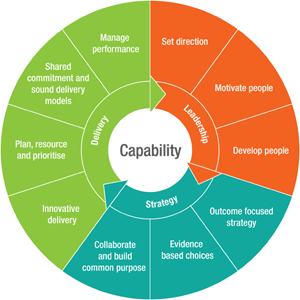Capability review: Department of Health
Capability review: Department of Health
In 2011, the Australian Public Service Commission (APSC) commenced a program of systematic reviews to assess capability in key agencies and identify opportunities to raise the institutional capability of the Australian Public Service as a whole.
The methodology used by the APSC to conduct these reviews has been gradually refined to more closely reflect the Australian context in which the review program is being conducted.
On the occasion of this review, I would like to thank the department for its professional and enthusiastic participation. All employees who participated in interviews and workshops were generous with their time and displayed great passion for their work.
I would also like to thank Rachel Hunter, the chair of the review team, other senior members of the team, Paul Fegan and Nigel Ray, and my own team from the APSC who supported and advised them. This review has demonstrated the advantages of bringing together a team of this calibre.
Stephen Sedgwick AO
Australian Public Service Commissioner
Context
Review scope
This review did not consider the capability of these three specialist areas of the department:
- Therapeutic Goods Administration
- National Industrial Chemicals Notification and Assessment Scheme
- Office of the Gene Technology Regulator.
The review considered the capability of all other areas of the department.
The department’s operating environment
Consistent with other Australian Public Service (APS) organisations, the department operates in a complex and changing environment. Its external challenges include:
- Australia’s ageing population, coupled with the growing prevalence of chronic disease
- increasing life expectancy with pressure being placed on the health system for a more sustained period
- increasing prevalence of ‘social diseases’ arising from lifestyle factors across the population
- continuing disparity in quality and equity of health outcomes
- geographic distribution of Australia’s population and the health workforce
- rapid advancements in medical research and technology (including clinical translation) in Australia and globally
- increasing globalisation of health issues and the risks associated with porous international borders
- threats to the integrity of sport both nationally and internationally
- interplay of responsibilities between the Commonwealth and state and territory jurisdictions
- numerous, diverse, vocal and influential stakeholder groups
- increasing number of policy issues that cross APS organisational boundaries
- resource-constrained environment
- long-run, unsustainable rate of growth for government health expenditure and the need to maintain Australia’s health standards amidst a backdrop of increasing citizen expectations.
In addition, the change of Government in 2013 introduced an increased focus on regulatory reform, smaller government and improved public service efficiency. The department was subject to Machinery-of-Government changes which returned the sport function, separated the ageing and some Indigenous functions, and consolidated a number of portfolio agencies.
There is further significant change ahead, including potentially in the context of the forthcoming White Paper on the Reform of the Federation.
1 About the review
A Capability Review is a forward-looking, organisational review that assesses an agency’s ability to meet future objectives and challenges. It is conducted in accordance with the Australian Public Service Commissioner’s statutory function to review any matter relating to the Australian Public Service under paragraph 41(2)(j) of the Public Service Act 1999.
This review focuses on leadership, strategy and delivery capabilities in the Department of Health (the department). It highlights the department’s internal management strengths and improvement opportunities using the model set out in Figure 1. A set of 39 questions is used to guide the assessment of each of the 10 elements of the model covered by this report.
Capability Reviews are designed to be relatively short and take a high-level view of the strategic operations of a department or agency. The report is primarily informed by interviews with Ministers, senior leaders and external stakeholders, though also considers the views of employees who attend a series of workshops and round-table discussions. External stakeholders interviewed include relevant ministerial staff, central agencies, state and territory organisations, peak bodies, interest groups and private sector companies.
This review considered more than 243 documents, conducted 15 internal workshops with more than 140 employees, 45 individual internal interviews and 67 external interviews.

Figure 1: Model of capability



